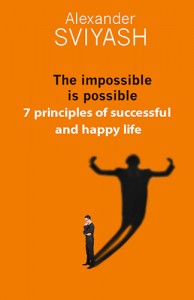Most people are dissatisfied with their material situation and would like to improve it.
Of course, this by no means applies to everyone.
This time we’ll talk about the ways in which the system of beliefs of poor people differs from that of rich people.
Although practically no one, with the possible exception of oligarchs, considers himself rich – it’s always possible to compare your wealth with someone else’s and feel inferior. Probably even oligarchs have a similar problem.
To start with, let’s look at how the poor and the rich value themselves.
1. How much is your time worth?
A poor person never knows the value of his own time. More precisely, for him it’s not worth anything. Because, without even thinking about it, he spends it on activities which are of absolutely no use to him.
Thus, for example, in soviet times, when practically the whole population was poor, it was accepted that when you received relatives as guests, you would go and meet them and bring them back. People would dodge work or get time off (no matter, they get paid anyway) and carry out their voluntary duties.
Then times changed, relatives were able to improve their financial situation, but this custom of collecting guests and bringing them back (especially if you’ve got a car) remained. It’s of no importance how much time you spend doing it, what’s important is to help people.
This is how poor people behave. But rich people would rather send their driver to pick guests up. Or suggest that they come by taxi. You only go and pick people up personally if they belong to a special category – for example, the woman you’re in love with or parents.
Here’s another example. Maybe you’re very focused on discounts, striving to buy everything as cheaply as possible. Various discount systems on the Internet have cashed in on this tendency of the psychologically poor – they respond to the needs of poor people to buy everything on discount.
In principle, rich people also love discounts (more precisely, they love money and part with it very reluctantly. Especially if they sense a lack of correspondence between price and quality)
The difference between poor and rich people consists in the fact that a poor person does not consider the amount of time he needs to expend in order to obtain the discount. He might spend months waiting for the opportunity buy an article he needs at a lower price. Then he’s prepared to travel to the other end of town for the purchase, and is sincerely overjoyed to have saved one hundred (one thousand or three thousand) roubles on it.
In practice, what’s happened is that he’s earned this money by expending his time.
And now you have to divide the amount of discount obtained by the amount of time expended in order to obtain it. And then you’ll realize what rate per hour will really make you happy.
If you’re a pensioner, and you’ve got more than enough free time, just about any rate will satisfy you.
And if you work somewhere, and sell your labour for a wage, have you increased or reduced your rate per hour by chasing after discounts?
Let’s clarify this idea with some figures.
Suppose you work for a business and earn on average $1600. To earn this money, you spend, in a month, 8 hours x 24 working days = 192 hours of labour time. This means that at some time the value of your labour was set at 16000 roubles a month or $1600/192 = $8.3 per hour.
Naturally, you consider that you should receive more. But that’s just one of your pretensions.
But what value do you really put on yourself, for how much money are you prepared to spend your time chasing after discounts?
Let’s calculate. Suppose you have spent approximately 6 hours searching for an article (maybe some technical gadget) which you need and which has an average value of $40.
You’ve looked at prices on the Internet, then carried out an investigation of prices in the shops, then you’ve gone into one shop to buy the article you need for $35.
That is, as a result of 6 hours of strenuous searching you have “earned” $5.
If we divide this $5 dollars by the 6 hours of searching, we find that for the time spent searching laboriously for the cheaper article, you have earned $0.83 per hour.
That is, you have reduced your “value” by 90%! Because your normal “rate” is $8.3 per hour.
That is, theoretically, you consider that you are worth a lot more than 8 dollars an hour. But in practice, you are sincerely delighted when your efforts have brought you $0.83 dollars per hour.
And this is your true value. Or maybe still lower if, the next time, you spend a lot more time getting an even bigger discount of $6.
This is the behaviour of a poor man – someone who is ready to spend his time chasing any sum of money.
Now let’s consider a well-to-do person with an average monthly income of $20000. He usually doesn’t know his “rate” per hour either. But he intuitively senses when it’s worthwhile for him to set aside time to look for a discount, but also when he should pay the asking price immediately, rather than expending time and effort searching for a cheaper article, on which he would only save what for him would be an insignificant amount.
Of course, the poor man will say: “ Give me 20 thousand a month, and I’ll chuck away money as well”.
But in this world, no one gives you anything for free, you have to earn it yourself. But you won’t start earning more, even if the possibility of earning more presents itself, if you are sincerely delighted by such small financial rewards.
Most likely you will simply not see such a possibility, because your permanent inner preoccupation is with acquiring small amounts of money.
What is my income ceiling?
Imagine this situation – you have been planning to get a car. Or a bike. Or an out-of-town plot of land.
You have a certain sum of money, which allows you to make a purchase which you can “afford”.
You like a car (bike, plot) which costs a bit more than the money you possess.
What do you choose to buy?
The overwhelming majority of people unconsciously go for safety. That is, the purchase they can “afford”.
That is , they adjust their needs to their current income. They don’t believe that their income might increase, because they don’t want to create extra complications for themselves. And this, despite their public declaration that they want to be better-off.
That is, man is afraid of an unknown future. He is conditioned to look into the past and downwards. He does not look forward into a future which he would like to realize.
How does a person who is really striving to become better-off act? He also relates his life to his real present income as well.
But he is continually striving to expand the limits of his possibilities. He is looking forward into the future. This is dangerous, demands great efforts and does not guarantee the achievement of results. But that look is forwards and upwards, towards new heights.
His Subconscious, seeing the danger ahead, brings the organism an additional impulse of energy, which helps him to overcome the danger.
And in this state of arousal he will easily find a way of earning the extra money needed to make the purchase.
This approach can even be used to increase your income. That is, to acquire things which are slightly (!!!) beyond your current savings. You’ll have to exert yourself a bit, but as a result you’ll find a way of making up the shortfall. Do the same thing on future occasions and gradually you’ll move into the zone of more expensive things and larger incomes.
So pay attention to your thoughts and behaviour when buying things. If you are always economizing and never go outside the limits of your current income (the comfort zone), then you have the set of convictions of a poor person.



